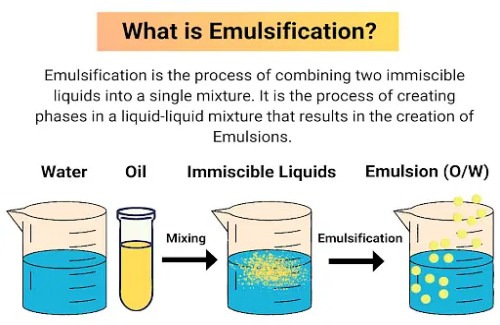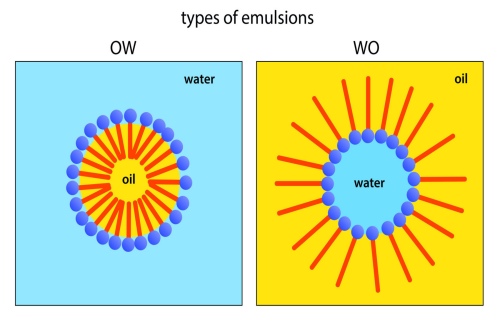The Top Benefits of Using Emulsifiers in Formulated Products
The Top Benefits of Using Emulsifiers in Formulated Products
Blog Article
The Science Behind Emulsifiers and Their Value in Modern Manufacturing
Emulsifiers play an essential duty in modern manufacturing, working as the unrecognized heroes that blend oil and water for a vast range of products. You may not recognize just how these substances boost appearance and stability, yet their influence is considerable across industries. As consumer choices change towards cleaner labels, the demand for innovative emulsifiers is expanding. What does this mean for the future of product formulation? Allow's check out even more.
What Are Emulsifiers?
Emulsifiers are essential representatives in the globe of food and item production, acting as the glue that binds two otherwise immiscible liquids, like oil and water. Usual examples include lecithin discovered in egg yolks and soybeans, and mono- and diglycerides made use of in numerous processed foods.

When you whip up a salad clothing or enjoy a creamy dessert, emulsifiers help keep that excellent structure. They ensure your products have a consistent mouthfeel and look, enhancing your total experience. Without emulsifiers, lots of foods would certainly separate, causing unwanted appearances and tastes. Following time you delight in a smooth sauce or spread, remember the unhonored heroes-- emulsifiers-- that make it all feasible.
The Chemistry of Emulsification
When you blend oil and water, you may notice they do not blend easily; that's where the chemistry of emulsification comes into play. To conquer this difficulty, emulsifiers are used.
When you include an emulsifier, its particles place themselves at the oil-water interface, reducing surface area stress and enabling the droplets to mix. The emulsifier forms a protective layer around each droplet, stopping them from integrating back into different layers.
Kinds Of Emulsifiers
Different sorts of emulsifiers play vital duties in supporting mixes of oil and water. You'll usually encounter 2 major groups: natural and synthetic emulsifiers. All-natural emulsifiers, like lecithin from egg yolks or soy, are obtained from plants and animals, making them preferred in foodstuff. They're generally thought about much safer and much healthier options.
On the other hand, synthetic emulsifiers, such as mono- and diglycerides, are chemically engineered to boost security and rack life. They're commonly utilized in processed foods and cosmetic products.
Furthermore, you may discover non-ionic, anionic, and cationic emulsifiers, each with one-of-a-kind properties that influence their efficiency. Non-ionic emulsifiers, for instance, work well in a vast variety of pH degrees, while anionic emulsifiers have a tendency to perform better in alkaline conditions. Understanding these kinds can aid you pick the best emulsifier for your specific application.
Mechanisms of Emulsion Development
Comprehending how solutions form is crucial for producing stable blends of oil and water. When you introduce an emulsifier, it lowers the surface area stress between the 2 liquids, allowing them to blend even more easily.
The emulsifier particles have a hydrophilic (water-attracting) head and a hydrophobic (oil-attracting) tail. When you add an emulsifier, these particles organize themselves at the oil-water interface.
Applications of Emulsifiers in Numerous Industries
Emulsifiers play an important function across different sectors, making your preferred foods smoother and more enjoyable. In cosmetics, they boost item appearance and stability, making certain an enjoyable application experience. And also, in drugs, they help deliver important components properly, improving total efficiency.
Food Sector Utilizes
While you might not realize it, emulsifiers play a vital function in the food market, boosting the structure, security, and life span of lots of products (Emulsifiers). They're frequently located in salad dressings, sauces, and mayonnaise, helping to mix oil and water for a smooth, constant item. In baked items, emulsifiers enhance dough handling and preserve moisture, resulting in a far better structure and extended quality. They're additionally important in dairy items, where they support emulsions in lotions and gelato, avoiding separation. Also in snacks, emulsifiers assist maintain crunchiness and avoid stagnant tastes. By ensuring harmony and top quality, emulsifiers are considerable to supplying the scrumptious items you enjoy each day, making them an essential component in contemporary food production.
Aesthetic Formulas Benefits
When it comes to cosmetic formulations, emulsifiers are important for producing products that feel lavish and do successfully. You'll notice that emulsifiers enhance item security, preventing useful link splitting up and lengthening shelf life. Overall, emulsifiers play an essential role in providing top quality cosmetic products that satisfy your charm requirements.
Pharmaceutical Applications Overview
In the pharmaceutical market, emulsifiers are important for creating efficient medicines. You'll discover emulsifiers in numerous dose types, like creams, lotions, and liquid suspensions, boosting the bioavailability of medications.
The Effect of Emulsifiers on Product Quality

By making certain secure emulsions, you reduce the risk of wasting and expand shelf life, eventually conserving you time and money. You'll also locate that emulsifiers can enhance the bioavailability of active components in your items, making them much more effective for consumers.
Furthermore, they allow you to create innovative solutions that fulfill diverse customer requirements. Whether you're crafting a velvety dressing or a lavish cream, emulsifiers are essential for accomplishing the desired results. Simply put, by recognizing and leveraging the influence of emulsifiers, you can significantly boost the top quality of your items.
Future Fads in Emulsifier Development
As the demand for cleaner tags and sustainable items rises, the advancement of brand-new emulsifiers is set to advance substantially. You'll see a shift towards plant-based and natural emulsifiers, driven by consumer preferences for active ingredients that are eco-friendly and much less refined. Technologies in biotechnology will likely enhance the capability and effectiveness of these emulsifiers, permitting suppliers to develop steady formulations with less additives.
You could also see a boost in multifunctional emulsifiers that not only stabilize solutions however additionally improve flavor, structure, or dietary worth. This fad might simplify ingredient listings while boosting product performance.
In addition, with breakthroughs in nanotechnology, emulsifiers might be engineered at the molecular degree to accomplish extraordinary stability and effectiveness. Emulsifiers. As you discover these trends, you'll find that the future of emulsifier growth is not almost functionality, but also about welcoming sustainability and transparency in ingredients
Regularly Asked Inquiries
Are Emulsifiers Safe for Consumption in Food Products?
Yes, emulsifiers are generally secure for usage in food items. They've been extensively examined and approved by food safety and security authorities, so you can enjoy your favorite dig this foods without bothering with their effect on your health and wellness.
Can Emulsifiers Be Derived From Natural Resources?
Yes, you can derive emulsifiers from all-natural sources. Active ingredients like lecithin from egg yolks or soybeans and casein from milk prevail. These natural emulsifiers help stabilize mixes without artificial ingredients, making them prominent in numerous items.

How Do Emulsifiers Affect Life Span of Products?
Emulsifiers support mixes, preventing separation and spoilage - Emulsifiers. By preserving harmony, they prolong products' service life, guaranteeing quality and top quality. You'll observe that emulsifiers help maintain your favorite foods and cosmetics performing well over time
What Are Possible Side Results of Emulsifiers?
You might experience digestive system concerns when consuming products with emulsifiers, as they can interfere with intestine microorganisms. Some researches suggest possible links to inflammation or allergies, but much important site more study is needed to totally comprehend these effects.

Are There Alternatives to Traditional Emulsifiers?
Yes, there are choices to standard emulsifiers. You can check out options like all-natural gum tissues, starches, or lecithin. Each alternate deals distinct buildings, so experiment to locate what jobs best for your certain application.
Report this page